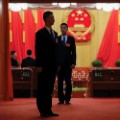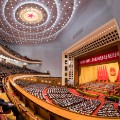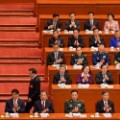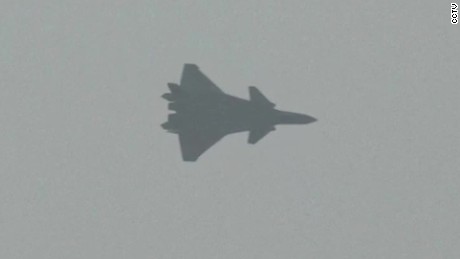China's modest military spending hike masks bigger goals
Hong Kong (CNN)China's announcement of the smallest percentage increase to its military budget since 2010 -- around 7% (to approximately $148 billion) -- seems designed in part to project the image of being the sober, peaceful force in the Asia-Pacific sphere.
Especially so, given that it came on the heels of the US President's call for a large increase (about 10%) in US military spending.
However, this could be a little deceptive, as additional US military spending will undoubtedly meet legislative resistance and ultimately fall short of the proposed $54 billion increase, whereas China does not have to contend with such internal opposition.
Furthermore, China's military spending is more opaque -- actual spending could be 20-40% more than what is reported -- and most likely does not include ongoing modernisation programs, despite official claims to the contrary.
So what will China spend its money on?
Although the Chinese military is still fairly traditional in that it is dominated by the army, China will continue to focus on structural reform in the coming years, especially further developing its naval and air force capabilities and integrating the three military branches.
Its new J-20 fighter, which officially entered into service last year, is purported to have stealth capability, and the air force is also pursuing a stealth bomber.
Meanwhile, the navy seeks to rapidly develop blue-water capability -- the ability to operate globally across open oceans.
Last year, it announced that its first aircraft carrier was combat-ready and that it has commissioned the construction of a second -- said by state media to be almost ready for launch. Recent personnel changes are also significant: the commanders of all three of the PLA Navy's fleets (East, South, and North China Sea Fleets) were suddenly promoted at the beginning of this year.
This included appointing Vice Admiral Yuan Yubai (formerly of the North China Sea Fleet) to lead the Southern Theatre Command, as the first non-army head of a theater command.
These equipment and personnel developments, in conjunction with ongoing restructuring efforts and the construction of a naval base in Djibouti (which would be contemporary China's first overseas military base), demonstrate a clear interest in force projection that belies the assurances of Premier Li Keqiang that China is only interested in "peace and stability."
Controversial statement
In announcing the budget increase this year, National People's Congress spokesperson Fu Ying noted that China lags far behind the US in military capacity, but reiterated the need to defend and "safeguard our sovereignty and interest and rights" and to preserve "peace and security in this region."
This was meant to sound benign, but it is actually a highly controversial statement, as regional stability includes consideration of the South China Sea. There are many competing claims to its islands and reefs, and China's construction and manning of artificial islands there is an ongoing source of tension.
Furthermore, a non-aggressive country that is only interested in self-defense would most likely not need blue-water capabilities or an overseas military base.
Even as China needs to reassure the international community that it has no aggressive intentions, which it is trying to do with its modest military budget increase this year, it is caught in a bit of a bind.
China seeks to become a major world power, and one of the hallmarks of such a status is blue-water capability and the ability to project military might globally; so to that end, it believes it must continue developing its military along all dimensions.
At the same time, this goal has domestic implications.
One consideration is that the large-scale lay-offs and demobilization, announced by President Xi Jinping in 2015, that would be necessary to modernize the PLA (now over 2 million strong) will lead to instability as many are left without work or pensions; though if handled properly, this can be managed.
Another is that the military build-up serves to further promote nationalism at home, which is already used in many cases as a distraction for serious domestic problems in the economic, political, and social realms.
China's recent forays into the East and South China Seas are in part a response to these domestic considerations.
China undoubtedly sees the populist, nationalist, and aggressive rhetoric coming from the current US president as an opportunity to step into the seeming gap in international leadership that has presented itself, and a muted military response such as this small budget increase is part of that strategy.
But it masks bigger goals. China cannot help but want to continue to transform and enhance its military in its quest to become a major international power.
This is, of course, a legitimate ambition, but military development necessarily poses more of a threat internationally, as well as fans the flames of nationalism at home, which may become difficult to contain, especially if an opportunity arises to test the military's new capabilities.

















No comments:
Post a Comment
Comments always welcome!